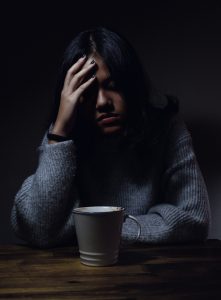If the winter months leave you feeling down in the dumps, it’s good to know that you’re not alone
The thermometer has plummeted, snow is on the cards and daylight hours are sadly lacking as we get up in the pitch blackness, and darkness greets us by the time we get home from work.
If you’re feeling down in the dumps about the months of short days and dark evenings, you’re not alone – the winter blues is much more common than you might think.
One common contributor to the winter blues can be a vitamin D deficiency.
Vitamin D is also known as ‘The Sunshine Vitamin’ because it can be synthesised by our bodies when sunlight hits our skin. Despite the name, Vitamin D is actually considered a pro hormone rather than a vitamin and is extremely important in helping build bone strength and keeping muscles strong. It also protects us from gum disease, boosts brain function and may improve heart health so it’s vitally important to know that you are getting what you need.
As well as being detrimental to bone and muscle health, a lack of vitamin D has also been linked to low moods, with people who are deficient in vitamin D being more at risk of depression.
Between late March/early April to the end of September, most people can get all the vitamin D they need through sunlight on their skin and from a balanced diet.
However, during the autumn and winter, you need to get vitamin D from your diet because the sun is not strong enough for the body to make vitamin D.
But since it’s difficult for people to get enough vitamin D from food alone, everyone should consider taking a daily supplement containing 10 micrograms of vitamin D during the autumn and winter.
And now, the NHS says it’s more important than ever to keep a check on our vitamin D levels as many of us have spent much more time indoors – and therefore out of the sunshine – than usual due to Covid-19 lockdown restrictions over the past 10 months.
Private healthcare company Check My Health offers a full healthy diet and nutrients check (£149) which provides a comprehensive overview of the micronutrients and vitamin levels in your body – including vitamin D – making it easy to understand how you can improve your overall health with small changes to your diet. Find out more at www.checkmyhealth.today

Millions of people in the UK suffer from Seasonal Affective Disorder.
While many of us can suffer from a bit of a low mood during the darker, colder winter months, for some people it can have a much greater effect.
If the change in the seasons leaves you suffering from a persistent low mood; a loss of pleasure or interest in normal everyday activities, irritability; feelings of despair, guilt and worthlessness; feeling lethargic and sleepy during the day; or craving carbohydrates and gaining weight, you make be one of the millions of people in the UK affected by Seasonal Affective Disorder.
According to the NHS, the exact cause of SAD is not fully understood, but the main theory is that a lack of sunlight might stop a part of the brain called the hypothalamus working properly, which may affect the:
production of melatonin – melatonin is a hormone that makes you feel sleepy; in people with SAD, the body may produce it in higher than normal levels;
production of serotonin – serotonin is a hormone that affects your mood, appetite and sleep; a lack of sunlight may lead to lower serotonin levels, which is linked to feelings of depression;
body’s internal clock (circadian rhythm) – your body uses sunlight to time various important functions, such as when you wake up, so lower light levels during the winter may disrupt your body clock and lead to symptoms of SAD.
It’s also possible that some people are more vulnerable to SAD as a result of their genes, as some cases appear to run in families.
If your feelings are interfering with your day-to-day life, it is advisable to see your GP. There is a range of treatments available, from lifestyle measures including getting as much natural sunlight as possible and exercising regularly, to light therapy, cognitive behavioural therapy and counselling.




